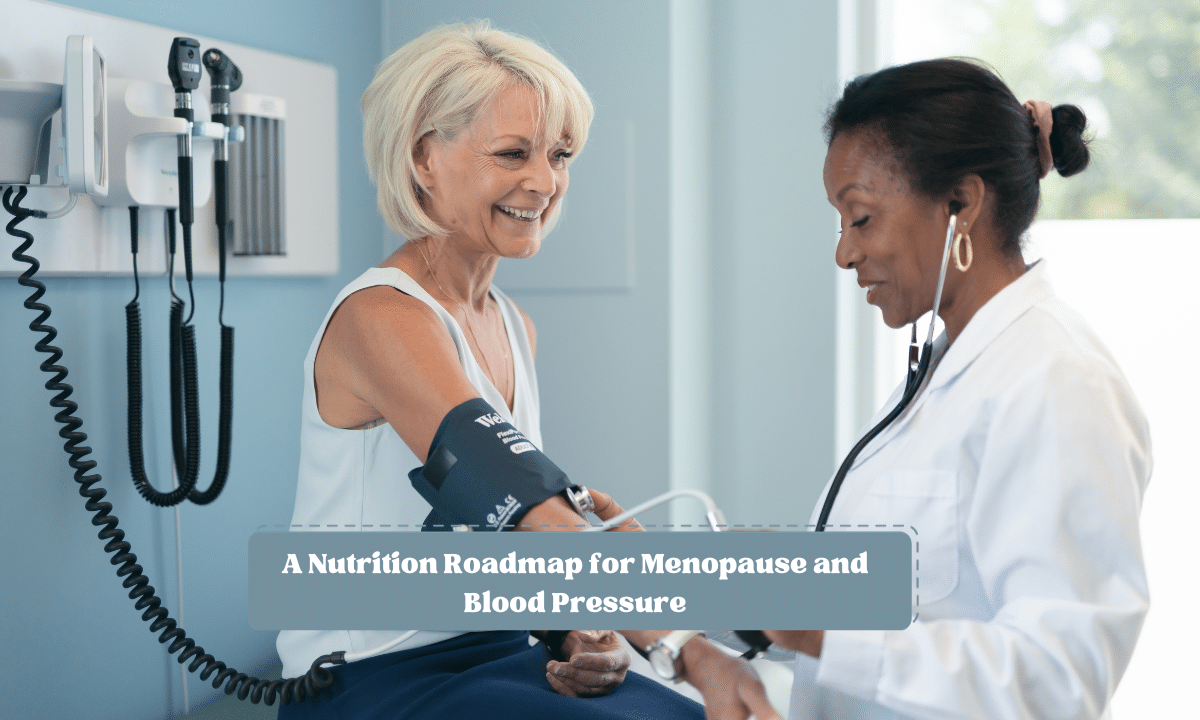Menopause and High Blood Pressure: Nutrition Can Help
High blood pressure is more common than we realize. This is especially true for women during menopause. Many changes that happen during this time, such as increased stress hormones, weight gain, and hormone fluctuations, can cause a rise in blood pressure.
Table of Contents
ToggleNutrition and lifestyle are the first steps to improve high blood pressure. Of course, your doctor can help you decide if you need medication in addition to lifestyle changes.
The Causes of Menopause and High Blood Pressure
Hormonal Imbalance
During menopause, there is a significant decrease in estrogen and progesterone, which can lead to hormonal imbalances.
These imbalances can cause increased blood pressure levels, as estrogen plays a role in regulating the function of blood vessels. When estrogen levels are low, blood vessels narrow, making it harder for blood to flow through them, and increasing blood pressure levels.
Age-Related Changes
As you age, the walls of your blood vessels become less elastic, making it easier for them to become clogged and leading to high blood pressure.
In general, the risk of elevated blood pressure increases after age 40. Approximately 30 to 50% of women develop hypertension before age 60. This can cause symptoms that are often attributed to menopause.
Lifestyle Factors
Menopause often coincides with other lifestyle changes, such as increased stress, poor diet, and less physical activity. These factors can all contribute to the development of high blood pressure.
Nutrition to Prevent and Treat High Blood Pressure
A balanced and nutritious diet is crucial in managing high blood pressure. Here are some dietary recommendations to follow:
Reduce Sodium Intake
Excessive salt consumption contributes to hypertension. Limit your sodium intake to no more than 2,300 milligrams per day.
Increase Potassium Intake
Potassium helps counteract the effects of sodium and regulate blood pressure. Adding fresh fruits and vegetables to your diet will provide good potassium. Other sources of potassium include beans and legumes, dairy products, nuts, and seeds.
Emphasize Fruits and Vegetables
These powerhouses of vitamins, minerals, and antioxidants are excellent for maintaining overall cardiovascular health. Aim for at least five servings a day.
Tips to eat more fruits and veggies
Opt for Whole Grains
Whole grains, such as brown rice, whole wheat bread, and quinoa, are high in fiber and can contribute to lower blood pressure.
Limit Caffeine Intake
While the evidence is inconclusive, excessive caffeine intake may temporarily raise blood pressure. If you’re sensitive to caffeine, consider reducing your consumption of coffee, tea, energy drinks, and other caffeinated beverages.
Moderate Alcohol Consumption
Excessive alcohol intake can raise blood pressure. If you choose to drink, do so in moderation—no more than one drink per day for women and two for men.
Best Eating Patterns for High Blood Pressure
Some diets can be especially beneficial for high blood pressure: the Mediterranean diet, the DASH diet, and the MIND diet.
Maintain a Healthy Weight
Excess body weight strains your heart and blood vessels, increasing the risk of high blood pressure.
However, maintaining a healthy weight is easier said than done for menopausal women.
Other Lifestyle Habits
Stay Physically Active
Regular physical activity is a key component of hypertension management.
Engaging in brisk walking, jogging, swimming, cycling, or dancing helps control blood pressure, strengthens your heart, and improves overall cardiovascular health.
Manage Stress
Chronic stress can contribute to high blood pressure.
Implementing stress management techniques such as deep breathing exercises, meditation, yoga, and regular relaxation can help reduce stress levels and promote healthier blood pressure.
The Bottom Line
Treating high blood pressure requires a comprehensive approach that combines healthy lifestyle choices and medical interventions when necessary.
You can take control of your blood pressure by eating healthy, exercising regularly, and managing stress,.
Remember, small changes can make a significant difference, so start implementing these steps today for a healthier tomorrow.

Dr. Su-Nui Escobar, a Registered Dietitian/Nutritionist in Miami, FL, is dedicated to empowering women in perimenopause and menopause to live healthier, more satisfying lives.
With a doctorate in clinical nutrition from the University of North Florida, she has expertise in menopause and weight loss, including the unique challenges faced by those on weight loss medications.
Su-Nui’s passion for her field is evident in her previous role as the Academy of Nutrition and Dietetics spokesperson.


